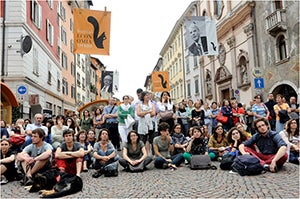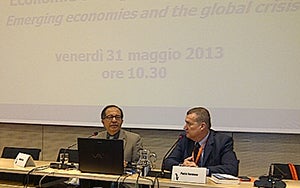 Evocative of the freewheeling talks in Athens’ open spaces by Socrates and Plato, last week’s Festival Economia Trento in Italy explored themes related to ‘Sovereignty in Conflict’, covering the Euro-zone debt crisis, global manufacturing chains, a new and more somber wave of globalization, welfare and social citizenship and a range of other topics.
Evocative of the freewheeling talks in Athens’ open spaces by Socrates and Plato, last week’s Festival Economia Trento in Italy explored themes related to ‘Sovereignty in Conflict’, covering the Euro-zone debt crisis, global manufacturing chains, a new and more somber wave of globalization, welfare and social citizenship and a range of other topics.
Fluttering banners with the faces of Michael Spence, James Mirrlees and others lined the cobbled streets and media stages as well as giant video screens populated the piazzas lined by renaissance buildings and historic chapels, with the Italian alps serving as a picturesque backdrop. Performances at the Teatro Sociale in the evening provided extra color. Click here to watch a brief video interview with Kaushik in Trento.
In Trento, Kaushik made two presentations – first was a lecture on ‘Emerging Nations and the Evolving Global Economy’; second was a discourse on his 2010 book, ‘Beyond the Invisible Hand: Groundwork for a New Economics,’ which was launched in Italian, thanks to Laterza, Italy’s intellectual publishing powerhouse.
Kaushik touched on the structural causes of the 2008 crisis as well as on the need for a stronger fiscal and monetary union in the Euro Area. He noted how deeply the latest crisis has affected developed and developing countries alike and how such periods of tumult bring into high relief the need to adapt to rather than resist the forces of globalization. After all, as Kaushik observed, resisting globalization is like trying to resist gravity or the force of the winds when sailing the high seas. To better navigate choppy monetary and fiscal waters, he proposed forming a ‘G Major’, saying such a grouping might include the US, the EU, China, Japan and a few other economies with central banks that carry a certain throw weight. That G Major would function like a well-tuned orchestra, thus mitigating exchange rate disruptions and sudden capital inflows and outflows, as have been seen recently.
To better navigate choppy monetary and fiscal waters, he proposed forming a ‘G Major’, saying such a grouping might include the US, the EU, China, Japan and a few other economies with central banks that carry a certain throw weight. That G Major would function like a well-tuned orchestra, thus mitigating exchange rate disruptions and sudden capital inflows and outflows, as have been seen recently.
Kaushik touched as well on the rising share of South-South trade, the growing clout of BRICS countries and how growing unemployment and continued inequality require moving beyond policies concentrated on unfettered capitalism.
During his book presentation, he pondered Adam Smith's proposition that, given certain conditions, self-interested behavior by individuals leads them to the social good, directed by an invisible hand. This insight has been mythologized over the years and held up as the pillar of free-market orthodoxy. According to Kaushik, mainstream economics and its conservative fans have twisted Smith's insight and muddled our understanding of how economies succeed or fail, and what the nature and role of the state might be. Comparing this view of the invisible hand with the vision described by Kafka--in which individuals pursuing their selfish interests end up creating a world that is mean and miserable—Kaushik made the case for collective action and the need to focus on creating a society that is both fair and efficient.
By re-examining Adam Smith's theory, ‘Beyond the Invisible Hand’ debunks traditional beliefs regarding best economic practices, self-interest, and the social good. Such a perspective is especially valuable for the World Bank Group as we intensify work on two key goals – getting extreme poverty below 3 percent by 2030 and promoting shared prosperity for people in the bottom 40 percent of every society in terms of per capita income.


Join the Conversation